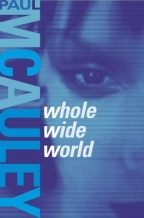Whole Wide World
Paul McAuley
Voyager / Harper Collins
UK Hardcover First
ISBN 0-00-225903-6
388 Pages ; £16.99
Date Reviewed: 03-01-02
Reviewed by: Rick Kleffel

REFERENCES
COLUMNS
|
|
|
Whole Wide WorldPaul McAuleyVoyager / Harper CollinsUK Hardcover FirstISBN 0-00-225903-6388 Pages ; £16.99Date Reviewed: 03-01-02Reviewed by: Rick Kleffel |
|
|
REFERENCES |
COLUMNS |
Science fiction and mystery have been sleeping together for a long time. It's not like it's any big secret. Isaac Asimov put himself in 'The Caves of Steel'. Stanislaw Lem conducted 'The Investigation' in broad daylight. Last year, in front of the 'Whole Wide World', Paul McAuley performed acts on paper that will hopefully be left there. But the War Against Terrorism is being used to fuel a whole wide world of ominous counter measures that leave even the most optimistic science fiction reader more than a little wary. The destruction of the New York skyscrapers on September 11, 2001 puts the novel published by McAuley on September 3, 2001 in a perilous perspective . Yesterday's might-be is today's history. And McAuley's future is rapidly becoming our present.
Here's the dust jacket blurb, in case you missed it:
"Then: terrorists bombed the city, brought down the internet and equalized the nation's bank accounts to zero.
Now: surveillance cameras on every street corner, their tireless gaze link to an artificial intelligence system. Censors patrolling the borders of the Internet."
OK, what next? You can ask our Attorney General. 'Whole Wide World' is McAuley's answer.
It's not particularly a pleasant world we have to look forward to, but then, it's not a particularly pleasant world we live in. Not when you think about pornography on the Internet, political and corporate greed, the abuses of power that are rampant. McAuley's future just makes all of these that much easier. The narrator of the novel is a detective in a downtrodden IT sub-unit of the London police. They've been passed by a sexier new unit with perhaps better technology, but when a woman is murdered slowly in a piece of web -broadcast performance art, the narrator, having problems with his girlfriend, takes on the case like a dog with a bone.
That's not unusual in a detective novel. Nor is the excessive violence and sexual violence that may drive some readers away. Those who stay are in for some excellent speculation on technology that is making an earlier appearance than any of us suspected as a result of the events of September 11, 2001. McAuley explores the faults and tolerances of this technology, multiplies them by the corporate and political greed that shines brightly in our faces as we're asked to show our identification at the gate.
McAuley has done a rather impressive job in his technological research on this material. Computers are the most misused props in books, movies and speeches of political intent. McAuley understands that they do not function in a purely magical fashion, that computers are tools created by imperfect humans and used by even more imperfect humans. The consequences of this reality echo through the mystery as red herrings and fake email headers are parsed in software programmed by trembling fingers.
McAuley also captures the not-so nice human part of the equation in his transatlantic prose. His character is something of a loser. Unfortunately, he may provide a little more detail with a little more detachment than some readers may be able to tolerate. Of course, this is the way of the current American mystery, and so much of the audience may find this perfectly palatable. It's rendered with such talent, with such foresight, and in hindsight, pure prophecy. McAuley had his fingers on the world's jugular. He's seen the present when it was still the past. We can only hope he's wrong about these counter measures we're taking. But the odds are against us.